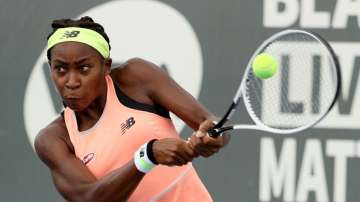US Open 2020: Coco Gauff, 16, lost learner's permit, found voice
Listen to Gauff speak about the issues of the day, and she doesn’t sound like an uninformed kid. She sounds like an adult, filled with knowledge and insight.

Listen to Coco Gauff speak about tennis, and she hardly sounds like a 16-year-old. She sounds like a veteran of the sport.
Listen to Gauff speak about the issues of the day, and she doesn’t sound like an uninformed kid. She sounds like an adult, filled with knowledge and insight.
Listen to her speak about not being able to practice driving because she misplaced her learner’s permit — and, finally, Gauff sounds her age.
“I still need to work on my parking,” Gauff acknowledges. “It’s so bad.”
Hard to find time working on that when there’s tennis to be played, and Gauff will be garnering plenty of attention again at the U.S. Open, which starts Monday.
A year ago, using a terrific first serve and ability to go from defense to offense, Gauff beat Venus Williams along the way to the fourth round at Wimbledon as the youngest qualifier in tournament history. Then she made it to the third round at Flushing Meadows before losing to 2018 champion Naomi Osaka in a match that ended in tears for the teen and a hug from the winner.
After collecting a singles trophy at Linz, Austria, in October — becoming the youngest WTA title winner since 2004 — Gauff began the 2020 Grand Slam season by defeating Williams again and winning a rematch against Osaka at the Australian Open en route to the fourth round there.
Gauff has a tough assignment in her first-round match at the U.S. Open, facing 31st-seeded Anastasija Sevastova, a 30-year-old from Latvia who was a semifinalist in New York two years ago.
“At her age, to have the awareness to see what’s going on in the real world, then the guts to actually speak out about it on social issues, is just phenomenal at this age. She has an amazing platform, she knows that. I think she’s used it so well already,” said Martina Navratilova, who won 18 Grand Slam singles titles. “I think she’s got a potential to really make an impact on and off the court, so I am so happy to see what she’s done so far off the court. On the court, I’m looking forward to her evolution as a tennis player. There is a lot there. It’s going to be fun to watch.”
Plenty of others anticipate big things from Gauff.
The American wants, and aims for, greatness, certainly, but she draws a distinction between that goal and any sense of putting pressure on herself.
“From a year (ago), I have more confidence. But it’s not so much like an expectation — I have belief that I can win, but not so much ‘expecting,’ if that makes sense. I mean, I don't try to put any expectations on myself. Whatever happens, happens,” Gauff said. “And you just try your best to approach the moment with your best tennis and your best mentality. That’s what I’m going to do at the U.S. Open.”
So one win is just a win, one loss is just a loss — but to be learned from.
Beaten at Lexington, Kentucky, this month in the semifinals of her first tournament after tennis was suspended because of the coronavirus pandemic, Gauff said afterward she would head to her hotel room and watch the defeat to try to understand what happened.
“I still don’t have a lot of matches under my belt,” said Gauff, who has played fewer than 70. “I’m still learning and adjusting to the tour.”
That sort of perspective comes through when she discusses racial injustice and police brutality, including during an impromptu speech at a Black Lives Matter rally in Florida in June, when she implored the audience: “We must first love each other. ... Second, we must take action. ... It’s in your hands to vote for my future, for my brothers’ future and for your future.”
Gauff said she found out about two minutes beforehand that she would be addressing the crowd — and her nervousness was compounded because she stepped to the microphone after her grandmother, who is “really good at those type of things.”
“It was just definitely from the heart, and I think when you speak from the heart, you get the message that you want,” Gauff said. “The world was just finally waking up. ... We need people to speak out.”